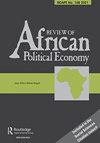(Un)Just transition in power generation: neoliberal reforms and climate crisis in Sudan
IF 1.4
3区 社会学
Q1 AREA STUDIES
引用次数: 0
Abstract
ABSTRACT Given the undisputable reality of climate change, this article explores Sudan's power generation and its approach to the current climate crisis, focusing on the perspective of a just energy transition. It highlights how the power sector's plans remain centralised, favouring urban consumerism, cost-driven energy sources, and inadequate social and environmental evaluations with limited community involvement. Furthermore, the absence of timely adaptation measures has left off-grid populations and those displaced by hydroelectric dams disproportionately vulnerable to worsening climate conditions, loss of traditional livelihoods, and conflicts over dwindling natural resources. This exacerbates instability and regional development disparities. The article advocates for a just energy transition in Sudan that not only reduces CO2 emissions but also minimises adverse impacts on local ecosystems and livelihoods. It suggests a blend of distributed and utility-scale renewable energy sources alongside existing hydro-thermal capacity. It also calls for prioritising power supply to off-grid communities through socially driven financing mechanisms, countering the neoliberal push for privatisation and full-cost recovery.(发电领域的(不)公正过渡:苏丹的新自由主义改革与气候危机
ABSTRACT 鉴于气候变化已成为不争的现实,本文探讨了苏丹的发电情况及其应对当前气候危机的方法,重点从公正的能源转型角度进行分析。文章强调了电力部门的计划是如何保持集中化、偏向城市消费主义、以成本为导向的能源、社会和环境评估不足以及社区参与有限的。此外,由于缺乏及时的适应措施,离网人口和那些因水电站大坝而流离失所的人极易受到气候条件恶化、传统生计丧失以及因自然资源日益减少而产生的冲突的影响。这加剧了不稳定和地区发展差距。文章主张在苏丹进行公正的能源转型,不仅要减少二氧化碳排放,还要尽量减少对当地生态系统和生计的不利影响。文章建议将分布式和公用事业规模的可再生能源与现有的水热发电能力相结合。它还呼吁通过社会驱动的融资机制优先向离网社区供电,抵制新自由主义对私有化和全成本回收的推动。
本文章由计算机程序翻译,如有差异,请以英文原文为准。
求助全文
约1分钟内获得全文
求助全文
来源期刊

Review of African Political Economy
Multiple-
CiteScore
3.00
自引率
7.70%
发文量
29
期刊介绍:
The Review of African Political Economy (ROAPE) is a refereed journal committed to encouraging high quality research and fostering excellence in the understanding of African political economy. Published quarterly by Routledge, Taylor & Francis Group for the ROAPE international collective it has since 1974 provided radical analysis of trends and issues in Africa. It has paid particular attention to the political economy of inequality, exploitation and oppression, whether driven by global forces or local ones (such as class, race, community and gender), and to materialist interpretations of change in Africa. It has sustained a critical analysis of the nature of power and the state in Africa.
 求助内容:
求助内容: 应助结果提醒方式:
应助结果提醒方式:


